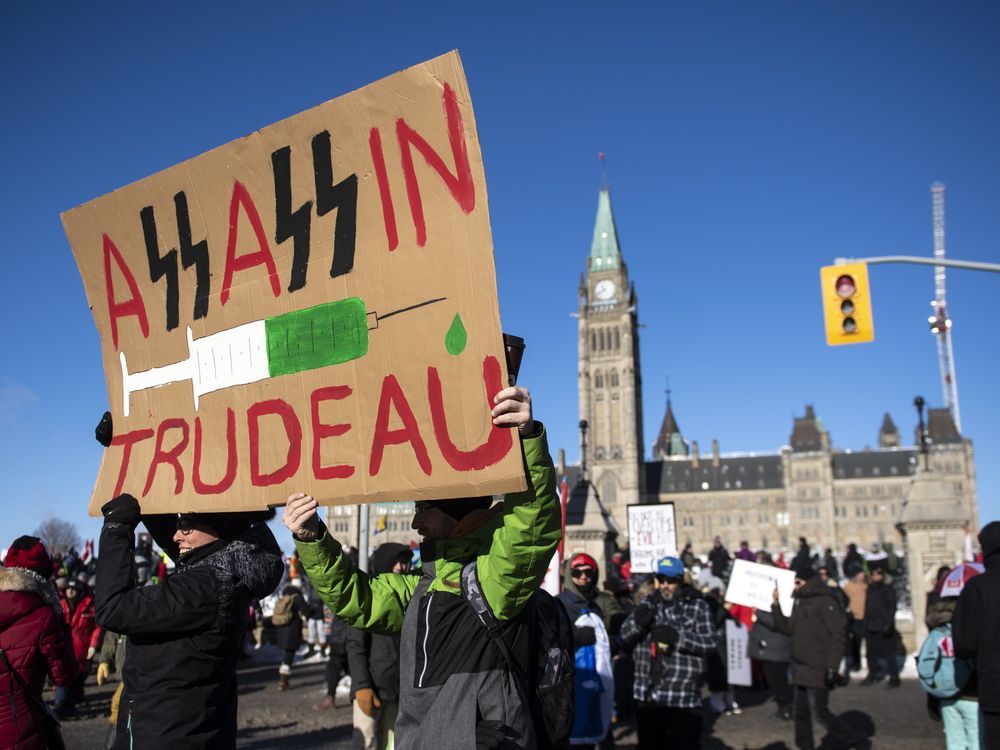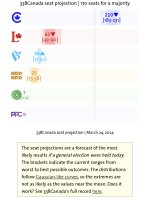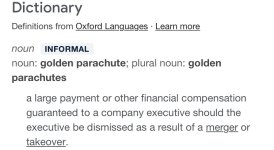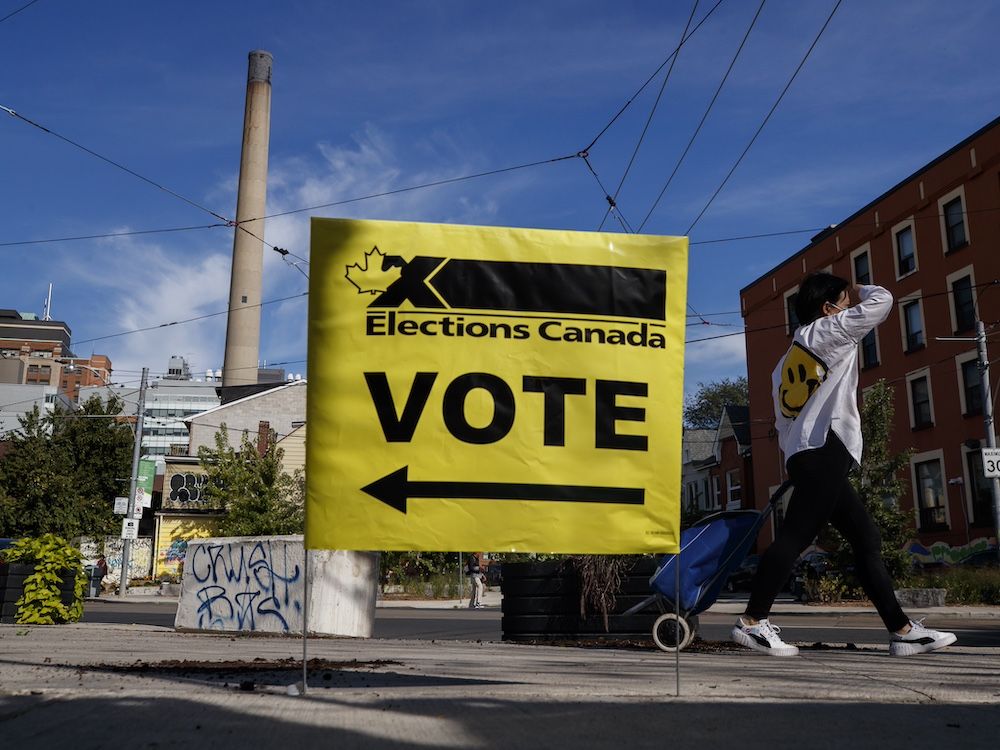Two years into the Trudeau 2.0 Minority Term, which day will Justin call the election that only he wants?
- Thread starter Ron in Regina
- Start date
You are using an out of date browser. It may not display this or other websites correctly.
You should upgrade or use an alternative browser.
You should upgrade or use an alternative browser.
And they will look after you just as soon as southern Ontario gets what they need first.Don't need a coalition in the West. it will be solid Conservative with a few areas of city freeloaders vote dipper or green.
If what has happened is regional representation becoming the priority such as with the BLOC; the Conservative stronghold is not western Canada. Nothing prevents voting together.
That said no one is stepping forward with a plan.
Anti-authority narratives could tear ’fabric of society,’ intelligence report warns
Author of the article:Canadian Press
Canadian Press
Jim Bronskill
Published Mar 24, 2024 • 5 minute read
79 Comments
People protest Prime Minister Justin Trudeau and vaccinations during a rally against COVID-19 restrictions on Parliament Hill, Saturday, Jan. 29, 2022.
People protest Prime Minister Justin Trudeau and vaccinations during a rally against COVID-19 restrictions on Parliament Hill, Saturday, Jan. 29, 2022. PHOTO BY JUSTIN TANG /The Canadian Press
Article content
OTTAWA — Threats against politicians have become “increasingly normalized” due to extremist narratives prompted by personal grievances and fuelled by misinformation or deliberate lies, warns a newly released intelligence report.
The report, prepared by a federal task force that aims to safeguard elections, says the Canadian violent extremist landscape has seen the proliferation of conspiracy theories, a growing lack of trust in the integrity of the state and more political polarization.
Baseless theories, disinformation and misinformation have spread to larger audiences, exposing online users to a vast network of narratives that undermine science, systems of government and traditional figures of authority, the report says.
“Violent rhetoric routinely fixates on elected officials — with particular hostility towards high-profile women.”
The Canadian Press used the Access to Information Act to obtain the June 2023 report by the Security and Intelligence Threats to Elections Task Force. Some passages in the “Secret / Canadian Eyes Only” assessment were considered too sensitive to release.
The federal body, established in 2019 to protect the electoral process from foreign interference, includes representatives of the Canadian Security Intelligence Service, the RCMP, Global Affairs Canada and the Communications Security Establishment, Canada’s cyberspy agency.
The report notes that while domestic terrorism threats are not strictly part of the task force’s focus on foreign meddling, “we recognize the need to provide assessments on this issue.”
The task force weighed the possible threat from violent extremism driven by politics, religion and ideology. It concluded that of the three, a Canadian federal election would “most likely be impacted” by ideologically motivated violent extremism.
There is no “one-size-fits-all” worldview for ideological extremism, the report says. Rather, “threat actors” are driven by a range of grievances, ideas and highly personalized narratives from across the traditional left-to-right-wing spectrum, often deeply influenced by conspiracy theories.
Grievances may be fuelled by elements including xenophobia, gender-related issues or general anti-government sentiment.
It says while threats against politicians peak during election cycles or major political announcements, RCMP information showed that monthly and annual averages had remained relatively stable since September 2021.
Ideologically motivated violent extremists “have increasingly normalized threats against prominent public figures outside the election cycle,” the report concludes.
All threats to the prime minister and other parliamentarians reported to the RCMP are triaged and assessed for a link to national security, the task force adds. About 20 per cent of reported threats to the prime minister and 13 per cent of those against parliamentarians between September 2021 and mid-2023 met the RCMP’s national security threshold.
While extremist narratives and conspiracy theories do not usually manifest themselves as an act of serious violence, “they have the potential to negatively affect the fabric of Canadian society,” the report says.
The RCMP did not respond to a request for comment in time for publication.
CSIS spokesman Eric Balsam said the 2023 assessment “remains unchanged.”
CSIS director David Vigneault told a House of Commons committee this month the spy service is devoting about half of its counter-terrorism resources to investigate the threat of ideologically motivated violent extremism. “We’ve seen a number of the threat vectors increasing,” he said.
The task force report says anti-authority extremists have “almost certainly leveraged” social media posts about foreign interference in Canadian elections to “reinforce pre-existing narratives around the inherent corruption of government institutions in Canada.”
However, a narrative on the scale of the “stolen election” rhetoric that prompted the Jan. 6, 2021, breach of the U.S. Capitol has not emerged in the Canadian political landscape, the report notes.
On the question of foreign interference, a broader companion report says that as of last June the task force had seen no evidence of a significant cyberthreat to Canadian electoral processes or election infrastructure from state actors.
Political parties, candidates and their staff continue to be targeted by cyberthreat activity, however, and this may take the form of online espionage, disinformation or fabricated videos known as deepfakes, the report adds.
Overall, the task force says “sophisticated, pervasive and persistent” meddling efforts constitute a serious threat to Canada’s national security and the integrity of its democratic institutions.
For certain foreign states, foreign interference activities “are part of their normal patterns of behaviour in Canada and often peak during election periods.”
Such interference, given its clandestine or deceptive nature, often takes place in a legal grey zone, where there are no laws regulating the activities or where interpretation of them is ambiguous, the report adds.
Canada is a high-priority foreign interference target due to its role in key global alliances and bodies, enjoying a “robust international reputation” that can be used or co-opted to help legitimize foreign state interests.
In addition, Canada’s advanced, knowledge-based economy is attractive to foreign states seeking to develop their own scientific and technological expertise, the report says. Finally, Canada is home to large diaspora communities, which some foreign states try to monitor, control or use to futher their own strategic goals.
“Foreign states develop important relationships in Canada year round to further their own political platforms, and will use these relationships to their advantage notably around election time.”
Under a federal protocol, the heads of key national security agencies would inform a special panel of senior bureaucrats of an interference attempt during an election period.
There would be a public announcement if the panel determined that an incident — or an accumulation of incidents — threatened Canada’s ability to have a free and fair election.
There was no such announcement in 2021 or concerning the 2019 election. In both ballots, the Liberals were returned to government with minority mandates while the Conservatives formed the official Opposition.
Allegations of foreign interference in these elections _ suggestions fuelled by anonymous leaks to the media — led to a chorus of calls for a public inquiry.
The commission of inquiry, led by Quebec judge Marie-Josee Hogue, resumes hearings on Wednesday.
The hearings will focus on the substance of allegations of foreign interference by China, India, Russia and others in the last two general elections.
The commission will hear from over 40 people, including Prime Minister Justin Trudeau, members of his cabinet, senior government officials, diaspora communities, political party representatives, Elections Canada and the office of the commissioner of Canada elections.
An initial report of findings from the commission is due May 3.
The inquiry will then shift to broader policy issues, looking at the ability of the government to detect, deter and counter foreign interference targeting Canada’s democratic processes. A final report is expected by the end of the year.

 torontosun.com
torontosun.com
Author of the article:Canadian Press
Canadian Press
Jim Bronskill
Published Mar 24, 2024 • 5 minute read
79 Comments
People protest Prime Minister Justin Trudeau and vaccinations during a rally against COVID-19 restrictions on Parliament Hill, Saturday, Jan. 29, 2022.
People protest Prime Minister Justin Trudeau and vaccinations during a rally against COVID-19 restrictions on Parliament Hill, Saturday, Jan. 29, 2022. PHOTO BY JUSTIN TANG /The Canadian Press
Article content
OTTAWA — Threats against politicians have become “increasingly normalized” due to extremist narratives prompted by personal grievances and fuelled by misinformation or deliberate lies, warns a newly released intelligence report.
The report, prepared by a federal task force that aims to safeguard elections, says the Canadian violent extremist landscape has seen the proliferation of conspiracy theories, a growing lack of trust in the integrity of the state and more political polarization.
Baseless theories, disinformation and misinformation have spread to larger audiences, exposing online users to a vast network of narratives that undermine science, systems of government and traditional figures of authority, the report says.
“Violent rhetoric routinely fixates on elected officials — with particular hostility towards high-profile women.”
The Canadian Press used the Access to Information Act to obtain the June 2023 report by the Security and Intelligence Threats to Elections Task Force. Some passages in the “Secret / Canadian Eyes Only” assessment were considered too sensitive to release.
The federal body, established in 2019 to protect the electoral process from foreign interference, includes representatives of the Canadian Security Intelligence Service, the RCMP, Global Affairs Canada and the Communications Security Establishment, Canada’s cyberspy agency.
The report notes that while domestic terrorism threats are not strictly part of the task force’s focus on foreign meddling, “we recognize the need to provide assessments on this issue.”
The task force weighed the possible threat from violent extremism driven by politics, religion and ideology. It concluded that of the three, a Canadian federal election would “most likely be impacted” by ideologically motivated violent extremism.
There is no “one-size-fits-all” worldview for ideological extremism, the report says. Rather, “threat actors” are driven by a range of grievances, ideas and highly personalized narratives from across the traditional left-to-right-wing spectrum, often deeply influenced by conspiracy theories.
Grievances may be fuelled by elements including xenophobia, gender-related issues or general anti-government sentiment.
It says while threats against politicians peak during election cycles or major political announcements, RCMP information showed that monthly and annual averages had remained relatively stable since September 2021.
Ideologically motivated violent extremists “have increasingly normalized threats against prominent public figures outside the election cycle,” the report concludes.
All threats to the prime minister and other parliamentarians reported to the RCMP are triaged and assessed for a link to national security, the task force adds. About 20 per cent of reported threats to the prime minister and 13 per cent of those against parliamentarians between September 2021 and mid-2023 met the RCMP’s national security threshold.
While extremist narratives and conspiracy theories do not usually manifest themselves as an act of serious violence, “they have the potential to negatively affect the fabric of Canadian society,” the report says.
The RCMP did not respond to a request for comment in time for publication.
CSIS spokesman Eric Balsam said the 2023 assessment “remains unchanged.”
CSIS director David Vigneault told a House of Commons committee this month the spy service is devoting about half of its counter-terrorism resources to investigate the threat of ideologically motivated violent extremism. “We’ve seen a number of the threat vectors increasing,” he said.
The task force report says anti-authority extremists have “almost certainly leveraged” social media posts about foreign interference in Canadian elections to “reinforce pre-existing narratives around the inherent corruption of government institutions in Canada.”
However, a narrative on the scale of the “stolen election” rhetoric that prompted the Jan. 6, 2021, breach of the U.S. Capitol has not emerged in the Canadian political landscape, the report notes.
On the question of foreign interference, a broader companion report says that as of last June the task force had seen no evidence of a significant cyberthreat to Canadian electoral processes or election infrastructure from state actors.
Political parties, candidates and their staff continue to be targeted by cyberthreat activity, however, and this may take the form of online espionage, disinformation or fabricated videos known as deepfakes, the report adds.
Overall, the task force says “sophisticated, pervasive and persistent” meddling efforts constitute a serious threat to Canada’s national security and the integrity of its democratic institutions.
For certain foreign states, foreign interference activities “are part of their normal patterns of behaviour in Canada and often peak during election periods.”
Such interference, given its clandestine or deceptive nature, often takes place in a legal grey zone, where there are no laws regulating the activities or where interpretation of them is ambiguous, the report adds.
Canada is a high-priority foreign interference target due to its role in key global alliances and bodies, enjoying a “robust international reputation” that can be used or co-opted to help legitimize foreign state interests.
In addition, Canada’s advanced, knowledge-based economy is attractive to foreign states seeking to develop their own scientific and technological expertise, the report says. Finally, Canada is home to large diaspora communities, which some foreign states try to monitor, control or use to futher their own strategic goals.
“Foreign states develop important relationships in Canada year round to further their own political platforms, and will use these relationships to their advantage notably around election time.”
Under a federal protocol, the heads of key national security agencies would inform a special panel of senior bureaucrats of an interference attempt during an election period.
There would be a public announcement if the panel determined that an incident — or an accumulation of incidents — threatened Canada’s ability to have a free and fair election.
There was no such announcement in 2021 or concerning the 2019 election. In both ballots, the Liberals were returned to government with minority mandates while the Conservatives formed the official Opposition.
Allegations of foreign interference in these elections _ suggestions fuelled by anonymous leaks to the media — led to a chorus of calls for a public inquiry.
The commission of inquiry, led by Quebec judge Marie-Josee Hogue, resumes hearings on Wednesday.
The hearings will focus on the substance of allegations of foreign interference by China, India, Russia and others in the last two general elections.
The commission will hear from over 40 people, including Prime Minister Justin Trudeau, members of his cabinet, senior government officials, diaspora communities, political party representatives, Elections Canada and the office of the commissioner of Canada elections.
An initial report of findings from the commission is due May 3.
The inquiry will then shift to broader policy issues, looking at the ability of the government to detect, deter and counter foreign interference targeting Canada’s democratic processes. A final report is expected by the end of the year.

Anti-authority narratives could tear ’fabric of society,’ intelligence report warns
The report by a federal task force says the Canadian violent extremist landscape has seen the proliferation of conspiracy theories.
Those scary old stock Canadians , bogey bogey man . Is that the Bee Gees or Long John Baldry . Scary call the cops .Anti-authority narratives could tear ’fabric of society,’ intelligence report warns
Author of the article:Canadian Press
Canadian Press
Jim Bronskill
Published Mar 24, 2024 • 5 minute read
79 Comments
People protest Prime Minister Justin Trudeau and vaccinations during a rally against COVID-19 restrictions on Parliament Hill, Saturday, Jan. 29, 2022.
People protest Prime Minister Justin Trudeau and vaccinations during a rally against COVID-19 restrictions on Parliament Hill, Saturday, Jan. 29, 2022. PHOTO BY JUSTIN TANG /The Canadian Press
Article content
OTTAWA — Threats against politicians have become “increasingly normalized” due to extremist narratives prompted by personal grievances and fuelled by misinformation or deliberate lies, warns a newly released intelligence report.
The report, prepared by a federal task force that aims to safeguard elections, says the Canadian violent extremist landscape has seen the proliferation of conspiracy theories, a growing lack of trust in the integrity of the state and more political polarization.
Baseless theories, disinformation and misinformation have spread to larger audiences, exposing online users to a vast network of narratives that undermine science, systems of government and traditional figures of authority, the report says.
“Violent rhetoric routinely fixates on elected officials — with particular hostility towards high-profile women.”
The Canadian Press used the Access to Information Act to obtain the June 2023 report by the Security and Intelligence Threats to Elections Task Force. Some passages in the “Secret / Canadian Eyes Only” assessment were considered too sensitive to release.
The federal body, established in 2019 to protect the electoral process from foreign interference, includes representatives of the Canadian Security Intelligence Service, the RCMP, Global Affairs Canada and the Communications Security Establishment, Canada’s cyberspy agency.
The report notes that while domestic terrorism threats are not strictly part of the task force’s focus on foreign meddling, “we recognize the need to provide assessments on this issue.”
The task force weighed the possible threat from violent extremism driven by politics, religion and ideology. It concluded that of the three, a Canadian federal election would “most likely be impacted” by ideologically motivated violent extremism.
There is no “one-size-fits-all” worldview for ideological extremism, the report says. Rather, “threat actors” are driven by a range of grievances, ideas and highly personalized narratives from across the traditional left-to-right-wing spectrum, often deeply influenced by conspiracy theories.
Grievances may be fuelled by elements including xenophobia, gender-related issues or general anti-government sentiment.
It says while threats against politicians peak during election cycles or major political announcements, RCMP information showed that monthly and annual averages had remained relatively stable since September 2021.
Ideologically motivated violent extremists “have increasingly normalized threats against prominent public figures outside the election cycle,” the report concludes.
All threats to the prime minister and other parliamentarians reported to the RCMP are triaged and assessed for a link to national security, the task force adds. About 20 per cent of reported threats to the prime minister and 13 per cent of those against parliamentarians between September 2021 and mid-2023 met the RCMP’s national security threshold.
While extremist narratives and conspiracy theories do not usually manifest themselves as an act of serious violence, “they have the potential to negatively affect the fabric of Canadian society,” the report says.
The RCMP did not respond to a request for comment in time for publication.
CSIS spokesman Eric Balsam said the 2023 assessment “remains unchanged.”
CSIS director David Vigneault told a House of Commons committee this month the spy service is devoting about half of its counter-terrorism resources to investigate the threat of ideologically motivated violent extremism. “We’ve seen a number of the threat vectors increasing,” he said.
The task force report says anti-authority extremists have “almost certainly leveraged” social media posts about foreign interference in Canadian elections to “reinforce pre-existing narratives around the inherent corruption of government institutions in Canada.”
However, a narrative on the scale of the “stolen election” rhetoric that prompted the Jan. 6, 2021, breach of the U.S. Capitol has not emerged in the Canadian political landscape, the report notes.
On the question of foreign interference, a broader companion report says that as of last June the task force had seen no evidence of a significant cyberthreat to Canadian electoral processes or election infrastructure from state actors.
Political parties, candidates and their staff continue to be targeted by cyberthreat activity, however, and this may take the form of online espionage, disinformation or fabricated videos known as deepfakes, the report adds.
Overall, the task force says “sophisticated, pervasive and persistent” meddling efforts constitute a serious threat to Canada’s national security and the integrity of its democratic institutions.
For certain foreign states, foreign interference activities “are part of their normal patterns of behaviour in Canada and often peak during election periods.”
Such interference, given its clandestine or deceptive nature, often takes place in a legal grey zone, where there are no laws regulating the activities or where interpretation of them is ambiguous, the report adds.
Canada is a high-priority foreign interference target due to its role in key global alliances and bodies, enjoying a “robust international reputation” that can be used or co-opted to help legitimize foreign state interests.
In addition, Canada’s advanced, knowledge-based economy is attractive to foreign states seeking to develop their own scientific and technological expertise, the report says. Finally, Canada is home to large diaspora communities, which some foreign states try to monitor, control or use to futher their own strategic goals.
“Foreign states develop important relationships in Canada year round to further their own political platforms, and will use these relationships to their advantage notably around election time.”
Under a federal protocol, the heads of key national security agencies would inform a special panel of senior bureaucrats of an interference attempt during an election period.
There would be a public announcement if the panel determined that an incident — or an accumulation of incidents — threatened Canada’s ability to have a free and fair election.
There was no such announcement in 2021 or concerning the 2019 election. In both ballots, the Liberals were returned to government with minority mandates while the Conservatives formed the official Opposition.
Allegations of foreign interference in these elections _ suggestions fuelled by anonymous leaks to the media — led to a chorus of calls for a public inquiry.
The commission of inquiry, led by Quebec judge Marie-Josee Hogue, resumes hearings on Wednesday.
The hearings will focus on the substance of allegations of foreign interference by China, India, Russia and others in the last two general elections.
The commission will hear from over 40 people, including Prime Minister Justin Trudeau, members of his cabinet, senior government officials, diaspora communities, political party representatives, Elections Canada and the office of the commissioner of Canada elections.
An initial report of findings from the commission is due May 3.
The inquiry will then shift to broader policy issues, looking at the ability of the government to detect, deter and counter foreign interference targeting Canada’s democratic processes. A final report is expected by the end of the year.

Anti-authority narratives could tear ’fabric of society,’ intelligence report warns
The report by a federal task force says the Canadian violent extremist landscape has seen the proliferation of conspiracy theories.torontosun.com
The block will probably pick up seats, in the vacuum of decimating the liberal and NDP parties, of those that live live in Quebec, but cannot vote for a party that will benefit the rest of Canadians outside of Quebec.

Won’t be the first time the bloc is the official opposition, only in Canadue .
Well, this election date is settled at October 27th, 2024. Done deal, with the losers knowing it in advance and setting up golden parachutes because they know they’re out and done.


The Bloc will be much stronger, the Conservatives will win a majority, the Greens will maybe even expand to 150% capacity and up to a bulging three seats.
The NDP & Liberals will split about 60-70 seats between themselves…as one party or two because that’s irrelevant at this point. Combined they will have about 20% of the seats in the House of Commons is my prediction, give or take a little bit one way or the other.
They’ll (the Liberal/NDP & NDP/Liberals) be like angry Chihuahuas in parliament as the adults try to mop up the last decade of “& you get an electric car rebate! And you get a heat pump loan, and anybody and their dog gets $2000 a month through the entire Covid goat rodeo including Revenue Canada agents and other civil servants in Justin Bucks” and other forms of stupidity and graft.
Barring some unimaginably cataclysmic event, Justin Trudeau’s Liberal government will be history by October next year. It will be up to Pierre Poilievre’s Conservatives to pick up the pieces of a shattered economy and the unfathomably bleak prospects facing almost every Canadian under the age of 30.
An unknowable American presidential election result that could change everything about the way the world works this fall doesn’t exactly help in the challenge of charting a course forward. A sophisticated grasp of the big-picture state of affairs in the current moment, though, will help.

 nationalpost.com
nationalpost.com


The Bloc will be much stronger, the Conservatives will win a majority, the Greens will maybe even expand to 150% capacity and up to a bulging three seats.
The NDP & Liberals will split about 60-70 seats between themselves…as one party or two because that’s irrelevant at this point. Combined they will have about 20% of the seats in the House of Commons is my prediction, give or take a little bit one way or the other.
They’ll (the Liberal/NDP & NDP/Liberals) be like angry Chihuahuas in parliament as the adults try to mop up the last decade of “& you get an electric car rebate! And you get a heat pump loan, and anybody and their dog gets $2000 a month through the entire Covid goat rodeo including Revenue Canada agents and other civil servants in Justin Bucks” and other forms of stupidity and graft.
Barring some unimaginably cataclysmic event, Justin Trudeau’s Liberal government will be history by October next year. It will be up to Pierre Poilievre’s Conservatives to pick up the pieces of a shattered economy and the unfathomably bleak prospects facing almost every Canadian under the age of 30.
An unknowable American presidential election result that could change everything about the way the world works this fall doesn’t exactly help in the challenge of charting a course forward. A sophisticated grasp of the big-picture state of affairs in the current moment, though, will help.

Terry Glavin: Liberals are leaving an ungodly mess for Poilievre's Conservatives to clean up
New report details just how easily China can mess with Canadian elections
I will need to see it to believe it. Canadians have shown they can be bought with their own money before.
Well, this election date is settled at October 27th, 2024. Done deal, with the losers knowing it in advance and setting up golden parachutes because they know they’re out and done.
The Bloc will be much stronger, the Conservatives will win a majority, the Greens will maybe even expand to 150% capacity and up to a bulging three seats.
The NDP & Liberals will split about 60-70 seats between themselves…as one party or two because that’s irrelevant at this point. Combined they will have about 20% of the seats in the House of Commons is my prediction, give or take a little bit one way or the other.
They’ll (the Liberal/NDP & NDP/Liberals) be like angry Chihuahuas in parliament as the adults try to mop up the last decade of “& you get an electric car rebate! And you get a heat pump loan, and anybody and their dog gets $2000 a month through the entire Covid goat rodeo including Revenue Canada agents and other civil servants in Justin Bucks” and other forms of stupidity and graft.
Barring some unimaginably cataclysmic event, Justin Trudeau’s Liberal government will be history by October next year. It will be up to Pierre Poilievre’s Conservatives to pick up the pieces of a shattered economy and the unfathomably bleak prospects facing almost every Canadian under the age of 30.
An unknowable American presidential election result that could change everything about the way the world works this fall doesn’t exactly help in the challenge of charting a course forward. A sophisticated grasp of the big-picture state of affairs in the current moment, though, will help.

Terry Glavin: Liberals are leaving an ungodly mess for Poilievre's Conservatives to clean up
New report details just how easily China can mess with Canadian electionsnationalpost.com
Poilievre had best stay away from windows. Trudeau is as bat shit crazy as Putin.
We know now the Election will be October 27th, 2025…so Trudeau/Singh get another 18 months to try & purchase Canadians votes with Canadian voters own money, or their children’s or grandchildren’s money…Poilievre had best stay away from windows. Trudeau is as bat shit crazy as Putin.
…& when the Liberal/NDP & NDP/Liberals tank and crater on October 27th, 2024, somebody’s going to have to come along behind them, and clean up the mess, and cancel a whole pile of supercilious failed vote purchasing programs that were never designed to succeeded anyway…& where all about optics. It will be ugly.
I agree, it will be ugly.We know now the Election will be October 27th, 2025…so Trudeau/Singh get another 18 months to try & purchase Canadians votes with Canadian voters own money, or their children’s or grandchildren’s money…
…& when the Liberal/NDP & NDP/Liberals tank and crater on October 27th, 2024, somebody’s going to have to come along behind them, and clean up the mess, and cancel a whole pile of supercilious failed vote purchasing programs that were never designed to succeeded anyway…& where all about optics. It will be ugly.
That's probably a good thing, actually. Means y'all got real issues and serious differences to work out.I agree, it will be ugly.
Well, this election date is settled at October 27th, 2024. Done deal, with the losers knowing it in advance and setting up golden parachutes because they know they’re out and done.
View attachment 21579
View attachment 21580
The Bloc will be much stronger, the Conservatives will win a majority, the Greens will maybe even expand to 150% capacity and up to a bulging three seats.
The NDP & Liberals will split about 60-70 seats between themselves…as one party or two because that’s irrelevant at this point. Combined they will have about 20% of the seats in the House of Commons is my prediction, give or take a little bit one way or the other.
They’ll (the Liberal/NDP & NDP/Liberals) be like angry Chihuahuas in parliament as the adults try to mop up the last decade of “& you get an electric car rebate! And you get a heat pump loan, and anybody and their dog gets $2000 a month through the entire Covid goat rodeo including Revenue Canada agents and other civil servants in Justin Bucks” and other forms of stupidity and graft.
Barring some unimaginably cataclysmic event, Justin Trudeau’s Liberal government will be history by October next year. It will be up to Pierre Poilievre’s Conservatives to pick up the pieces of a shattered economy and the unfathomably bleak prospects facing almost every Canadian under the age of 30.
An unknowable American presidential election result that could change everything about the way the world works this fall doesn’t exactly help in the challenge of charting a course forward. A sophisticated grasp of the big-picture state of affairs in the current moment, though, will help.

Terry Glavin: Liberals are leaving an ungodly mess for Poilievre's Conservatives to clean up
New report details just how easily China can mess with Canadian electionsnationalpost.com

Trudeau moves election date to ensure 80 MPs qualify for pension
#RebelNews #SheilaGunnReid #ProtectOurDemocracy►http://www.ProtectOurDemocracy.ca | Tell the Trudeau Liberals we don't want their election changes!Sheila Gun...
Its for Dawali.
Trudeau moves election date to ensure 80 MPs qualify for pension
#RebelNews #SheilaGunnReid #ProtectOurDemocracy►http://www.ProtectOurDemocracy.ca | Tell the Trudeau Liberals we don't want their election changes!Sheila Gun...www.youtube.com
Shameless Canadian PM Trudeau Tries To Pretend China Didn’t Rig Elections in His Favor, Even After Damaging Public Inquiry Revelations
I bet he even lied on his resume.Shameless Canadian PM Trudeau Tries To Pretend China Didn’t Rig Elections in His Favor, Even After Damaging Public Inquiry Revelations
He would have too how else can he avoid mentioning his leave from teaching in Vancouver and the NDA with a former studentI bet he even lied on his resume.
he also lied on his birth certificate.I bet he even lied on his resume.

